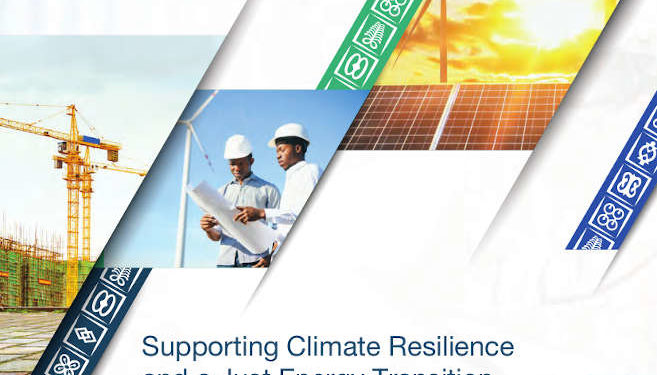AfDB (African Development Bank) forecasts Africa’s real GDP to grow by 4.1% in 2022, markedly lower than the near 7% growth rate in 2021. This sluggish pace of growth has been attributed to adverse impact of the Russia–Ukraine conflict on Africa’s economy.
According to the 2022 African Economic Outlook Report, published by the AfDB, the lingering COVID-19 pandemic and the Russia–Ukraine conflict, threaten to set back the continent’s promising economic prospects. The report warns that Africa risks sliding into stagflation—a combination of slow growth and high inflation.

The AfDB report says Africa’s low COVID-19 vaccination rollout, persistent sovereign debt vulnerabilities, high debt levels, and climate and environmental concerns remain the main threats to medium- and long-term growth trajectories.
AfDB cites the Russian-Ukraine conflict, COVID-19 low vaccination, and effects of climate change, as threats to Africa’s economy
The report mentions that disruptions to global trade and supply chains—primarily in agricultural, fertilizer, and energy sectors—following the Russia–Ukraine conflict and the corresponding sanctions on trade with Russia have tilted the balance of risks to Africa’s economic outlook to the downside.
The impact is, however, likely to be asymmetrical. On the one hand, net oil- and other commodity-exporting African countries could benefit from higher prices of their exported commodities.
On the other, the impacts on net energy-, food-, and other commodity-importing countries, are concerning as higher food and energy prices will exacerbate inflationary pressures and constrain economic activity.
Vulnerable populations, especially in urban areas, will be hit by rising food and energy prices, leading to social tensions.
“An urgent countercyclical policy response such as subsidies to mitigate the impact of higher food and energy costs is needed. But in many African countries, fiscal space remains constrained by the effects of the pandemic. Revenues have not recovered to pre-pandemic levels, and spending pressure remains elevated,” said Dr Akinwumi A. Adesina, President, AfDB Group.
The Bank has thus swiftly responded with a $1.5 billion African Food Crisis Response and Emergency Facility to rapidly ramp up food production and fertilizer supply and alleviate social sector financing constraints in Regional Member Countries.
This measure will help address food security-related challenges caused by the Russia–Ukraine conflict and ensure food and nutrition security in the short to medium term.
If the conflict persists, Africa’s growth will likely stagnate at around 4% in 2023.
Strikingly, oil-importing countries will gain the most in 2023, with growth increasing from 3.7 per cent in 2022 to 4.1 per cent, underscoring the resilience and diversified sources of growth in these economies.
But their expansion will be mitigated by the projected slight growth deceleration in net oil-exporting countries, from 4.4 per cent in 2022 to 4.1 per cent in 2023.
“With bilateral and multilateral development partners, the private sector, and African governments working together, the continent will emerge stronger from the socioeconomic disruptions brought about by the triple effects of the COVID19 pandemic, the Russia–Ukraine conflict, and climate change,” said Dr Adesina.
ALSO READ: AfDB Launches $1.5 Billion Fund to Prevent Food Shortage in Africa




